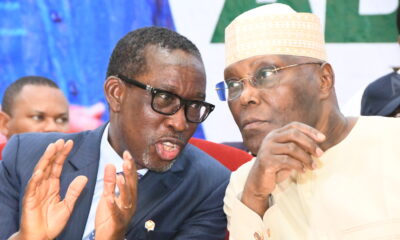OPINION
DELTA STATE LOCAL GOVERNMENT STAFF SALARY ARREARS: SETTING THE RECORDS STRAIGHT

By Jackson Ekwugum
Every conceivable attempt is being made by critics and political jobbers to cast aspersions on Governor Ifeanyi Okowa over the salary arrears imbroglio in the 25 Local Government Councils of Delta State. Just last week, a shadowy group known as the Centre for the Vulnerable and the Underprivileged, CENTREP, issued a press statement in which it accused the State Government of owing workers in the 25 Local Government Councils thirteen months’ salary arrears.
In the Statement signed by its Executive Director, Mr. Oghenejabor Ikimi, CENTREP gave the State Government seven days ultimatum “to defray the thirteen months’ salaries being owed local government workers with the Paris Club loan refund.” The group then threatened to institute a “public interest suit” against the Delta State Government”, to enforce the fundamental rights of council workers across the 25 Local Government Councils in the State.
The position of CENTREP, which sadly betrays ignorance of the political structure of the Nigerian Federation, is painfully the thinking of many people. There is widespread ignorance on this matter and it is a sad commentary on the level of political education in the country. Every now and then, I come across educated and highly placed individuals who are understandably chagrined that local government workers are owed for months. It has been burdensome and, quite frankly, draining to have to explain to people every time about the true state of affairs in the Local Government Councils.
First of all, the local government is a distinct arm of government guaranteed by Sections 7 and 8 of the 1999 Constitution of the Federal Republic of Nigeria (as amended). Secondly, it is not true that all the 25 local government councils owe their workers for thirteen months. Each of the local governments are owing for different periods of time depending on their capacity to pay, which is a function of the statutory allocation they receive from the Federation Account Allocation Committee. For instance, while Ethiope West and Ika North East Local Government Councils owe salary arrears for twelve months and ten months respectively, Warri North and Burutu local governments owe for four months each. So clearly it amounts to misrepresentation and, perhaps, mischief for anybody to tell the public that all the 25 local governments owe for thirteen months.
The question then is; why do some local governments owe for longer periods than others? Again, unlike the unfortunate impression that has been created in some quarters that the State Government is responsible for the crisis, the ability of a local government to pay is not only based on the amount of money it receives from the Federation Account, the amount due to the 774 local government areas in the country differs from one local government to the other.
The Federal Government has a formula for computing the money due to States from FAAC. That is why, for instance, the amount Delta receives is different from that of Edo and that of Edo is different from Anambra. It is the same thing with local governments; they don’t all receive the same amount from FAAC and the amount varies from month to month. At the monthly FAAC meetings, the allocations to the local governments are released alongside those of the States. The amount due each local government in the country is clearly stated and published by the Federal Ministry of Finance for anybody who cares to check. No State Government can tamper with it because it is public knowledge.
That is why you will not hear from the local government chairmen or officials that the State Government is withholding their money. It has never happened in Delta State.
The Local Governments, like the States, started having problems when the price of crude oil nosedived in 2014 and the receipts from FAAC naturally plummeted. Before Governor Okowa assumed office on May 29, 2015, the local governments were behind in the payment of salaries for several months. Please note that this was not the fault of the immediate past administration; it was just the situation the country found itself in. The 25 local governments in Delta State have a combined wage bill of about N3.5b while currently the average monthly receipt from FAAC hovers around N2.4b. That is a shortfall of N1b or more. Bear in mind that all the local governments do not receive the same amount. And since the amount each local government receives varies from month to month, the salary arrears also vary accordingly. This is because their ability to pay is dependent on their statutory allocations and internally generated revenue each month.
As a grassroots politician and former local government chairman, Governor Okowa empathises with the pain and suffering of the local government workers and is committed to assisting the Local Government Councils to redress the situation. Since he assumed office on May 29, 2015, his administration has faithfully paid 10% of its Internally Generated Revenue to the local governments at the monthly Joint Allocation Account Committee (JAAC) meetings of the State. In addition, from the N10b bailout fund received from the Federal Government in 2015, the State Government disbursed N3.2b to the local governments for the payment of salaries.
From the Paris Club Loan refund, another N5.1b was remitted to the local governments, also for the payment of salaries.
Unfortunately, these interventions have not been enough to offset the accumulated salary arrears dating back to 2014. The total indebtedness of the local governments to their workers as at the end of May 2017 stood at N15.3b. At the moment, the State Government can only do so much given its own financial challenges. This administration has been receiving a third or less of what the State used to receive as statutory allocation.
In April 2017, the State received about N5.8b as statutory allocation after loan repayment deductions at source. Meanwhile, it has a wage bill well in excess of N6b to meet. The Internally Generated Revenue, which was largely dependent on the performance of the oil industry, has also not fared better because most of the oil companies and oil servicing companies moved out of Delta State due to security concerns. Although the State has been regular in the payment of its workers, it is still indebted to them to the tune of N4.8b being deductions due to the unions and cooperatives. Needless to say that Government does not exist just to pay salaries. It has to construct roads, build hospitals, schools and provide other amenities essential for inclusive economic growth and sustainable development.
Nevertheless, Governor Okowa remains deeply concerned about the plight of the local government workers. Being the compassionate man that he is, he has given assurance that lending support to the local governments will receive priority attention as soon as the revenue profile of the State improves and the debt service obligations are mitigated. In the meantime, it is also imperative for the elected Chairmen of the local governments to sit down with the management of their Councils, NULGE and NUT to fashion creative ways out of this logjam.
There are the issues of internal revenue generation, the bloated workforce, and the high salary grade levels that are at variance with that of other local governments in the Federation, for them to critically and dispassionately examine. His Excellency, the Governor, a grassroots politician and a man well versed in local government administration, has always provided the local government chairmen the benefit of his knowledge and experience in this regard. But he cannot make the decisions for them as that would amount to a contravention of the extant laws of the land.
Ekwugum is Manager, Communications, Government House, Asaba.




















